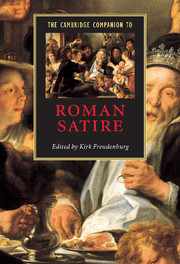Introduction
Roman satire
Published online by Cambridge University Press: 28 May 2006
Summary
Origins: Lucilius
Near the beginning of the tenth book of his Institutes, midway through a list of readings recommended for the orator in training, Quintilian, Rome’s most prolific theorist of rhetoric after Cicero, takes a tendentious step towards satire’s terrain by claiming that this particular genre can be accounted “totally ours.” The claim is tendentious because extreme, and true only in a highly qualified sense. For ancient critics had long since sought to establish the genre’s Greek pedigree by tracing its development past its most obvious early practitioners in Republican Rome (Ennius and Lucilius, both of whom wrote in the second century bce) all the way to fifth-century Athens. Claims of satire’s Greek provenience, although they could easily be stretched to an opposite extreme, are defensible and seem to have at least some narrow basis in fact.
Horace, writing more than one hundred years before Quintilian, was aware of both extremes. Perhaps to goad those in his audience who adamantly defended the idea that satire sprouted entirely from Roman soil, but perhaps also to mimic those who wanted to believe that any good thing in Roman literature just had to come from the Greeks, Horace went so far as to assert that Lucilius did not a whit more to invent satire than to rework the meters of Greek Old Comedy (“having changed only their meters and rhythms,” mutatis tantum pedibus numerisque, Sermones 1.4.7).
- Type
- Chapter
- Information
- The Cambridge Companion to Roman Satire , pp. 1 - 30Publisher: Cambridge University PressPrint publication year: 2005
- 13
- Cited by



